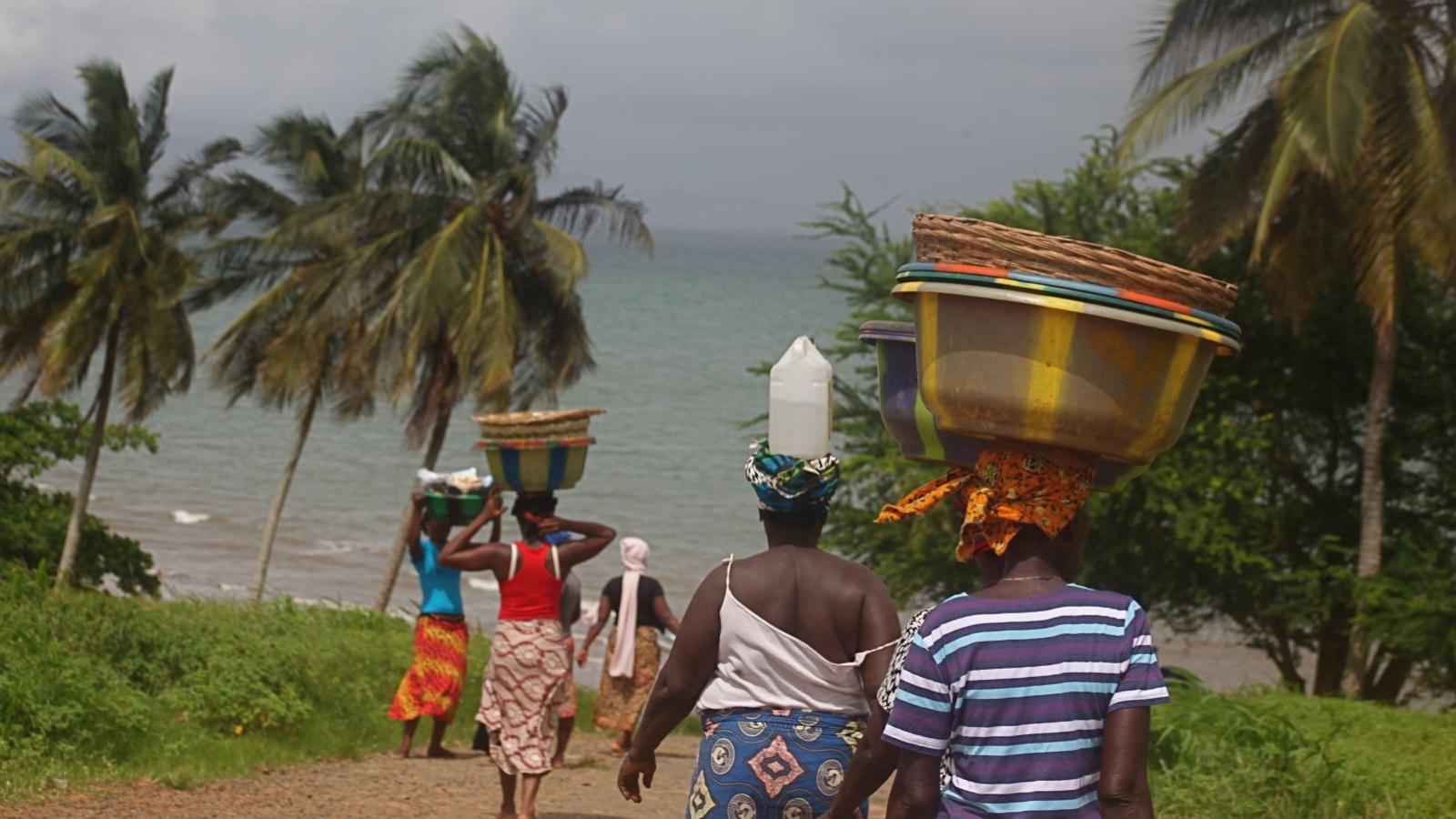This article was originally published by Ebola Deeply.
By Cinnatus Dumbaya
Freetown’s recent new surge in cases may be linked to a fisherman from Port Loko who arrived in the capital’s Magazine Wharf. Cinnatus Dumbaya braved the dusk-to-dawn curfew in Lungi, Port Loko, to meet Unisa Kamara, a veteran fisherman caught up in Ebola’s wake.
Unisa Kamara lives in Yongro town, Lungi, Port Loko. He has spent much of the past 25 years at sea, catching species such as herring and shine nose in the Atlantic. He now manages a team of 35 fishermen, and owns two fishing vessels.
Ebola Deeply: Has Ebola, and the current curfew, impacted your daily catches?
Kamara: It is very difficult these days with fishing. We are afraid of the curfew so we don’t go out to fish anymore like we used to. Even our customers, the fishmongers, are afraid of the 6 p.m. to 6 a.m. curfew order. Soldiers are very strict to ensure that people comply.
We used to go out at 5 a.m. and return around 4 p.m. Now we have to wait until 8 a.m. to go out, and we have to return early, around 1 p.m. If we arrive any later, our customers won’t get the fish early enough to sell them in the market before it’s too late. If you don’t come early to land, you lose your customers.
If the sea favors me, I can make up to 1 million leones and above ($200). But now it’s hard to even get half of that. Sometimes I even struggle to get enough money that will buy fuel for my machines. This is a difficult period for all of us.
Ebola Deeply: How has this affected the livelihood of your family and your workers?
Kamara: This 6 p.m. to 6 a.m. curfew has affected everyone, and we as fishermen are not excluded. Fishing is our main business and means of providing for our families. Because we can’t stay long at sea, I can’t earn enough these days to even feed my family well.
Fishing has done many big things for me and my family. This whole town and our neighbors solely rely on fishing. That’s the only thing we know. We don’t even do much agriculture. Here, all of us go to sea. I have over 70 mouths to feed in my household. These include my brothers, sisters, cousins, and other extended family members, plus some of my workers and their families. They rely on me if they get sick, or they have problems. My only source of income is from fishing.
I have about 35 workers who fish using my two boats, named Third World I and Third World II. They go to the sea and come back complaining that even though they could have got enough catch, there is not much time to bait the fish because they have to rush back to land.
Ebola Deeply: Has Yongro town been affected by Ebola otherwise?
Kamara: We have seen people die from Ebola in neighboring villages and towns, but Yongro hasn’t had any cases. We have been told not to keep sick people or wash dead bodies. That is what we are doing. We are trying our best to comply with the messages from officials.

Unisa Kamara by the ocean in Lungi, Port Loko
Ebola Deeply: What is the secret behind your town’s Ebola success?
Kamara: I think it’s by the grace of God, but we are also getting protection from the sea. As fishermen, we don’t catch Ebola because we are at sea and the sea is medicinal for us. The seawater protects us from Ebola, and any other disease for that matter. (Laughs.) The water is medicinal.
Ebola Deeply: Are you really sure about this?
Kamara: My brother, I am proud to tell you that for some of us closer to the sea and the beach, we can’t have Ebola. It’s evident. Have you heard of any cases in Yongro? And yet, we have to abide by the laws that are in place. Otherwise, we will be embarrassed by the soldiers. Now they even beat up people. So you see! It’s not just a matter of preventing yourself from catching Ebola, but also preventing embarrassment from the soldiers.
Ebola Deeply: Fishermen have been blamed for several cases of Ebola in Freetown, including a recent one last week. It’s said that some of them have transported sick people to Freetown by sea.
Kamara: I can’t completely say it’s true and I can’t deny it as well. I only take fishermen on board my boats, not passengers. But there is the possibility for some other wicked boat owners, who run commercial boats, to do this. There are so many crossing points between our areas to Freetown I think the harbor masters at the wharfs should be more vigilant, to ensure that they properly check and screen boats.
Ebola Deeply: What are your fears, as this outbreak continues much longer than predicted?
Kamara: That people will die of hunger and suffering. That we won’t have anything again. No money and no better medical facilities.
My neighbor’s pregnant wife died yesterday at home; she was turned away by the nurses at the hospital. We went to the government hospital with her because we have been warned strictly by the authorities not to allow our women to deliver at home by traditional birth attendants. But unfortunately, when we took her to the government hospital here in Lungi we were sent back home. She died at home, leaving behind her young kids. That is not the first time it’s happened. Pregnant women and children are dying because of no attention at the hospital. If Ebola doesn’t end soon, our women will continue to face challenges accessing medical care, especially pregnant women.
*****
*****
Cinnatus Dumbaya is a contributor at Ebola Deeply.
[Photos courtesy of Ebola Deeply]